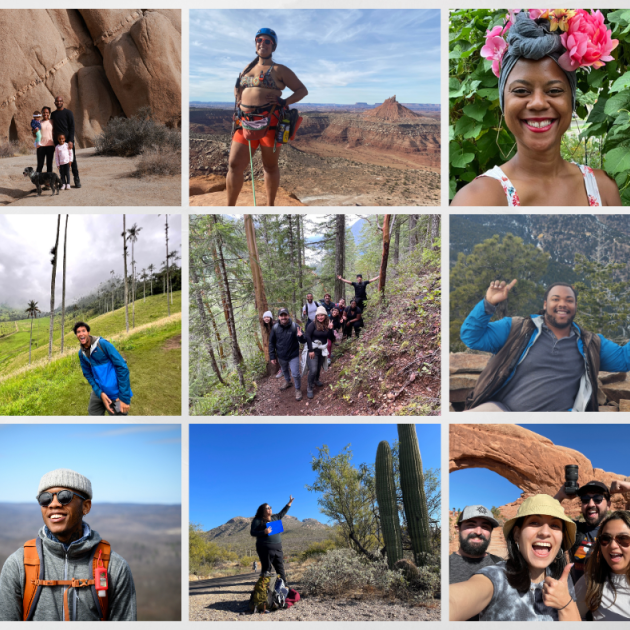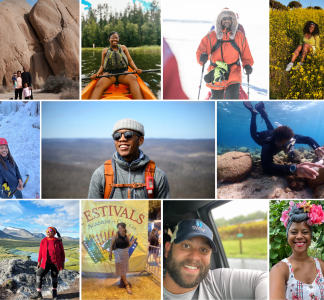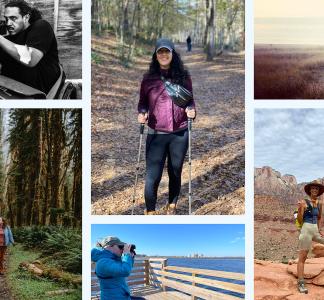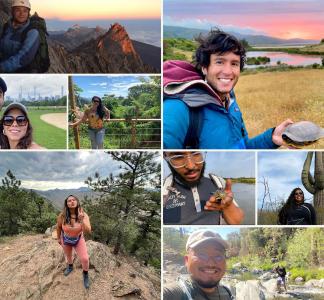6 Asian and Asian American outdoor advocates and conservationists talk about their connection to nature
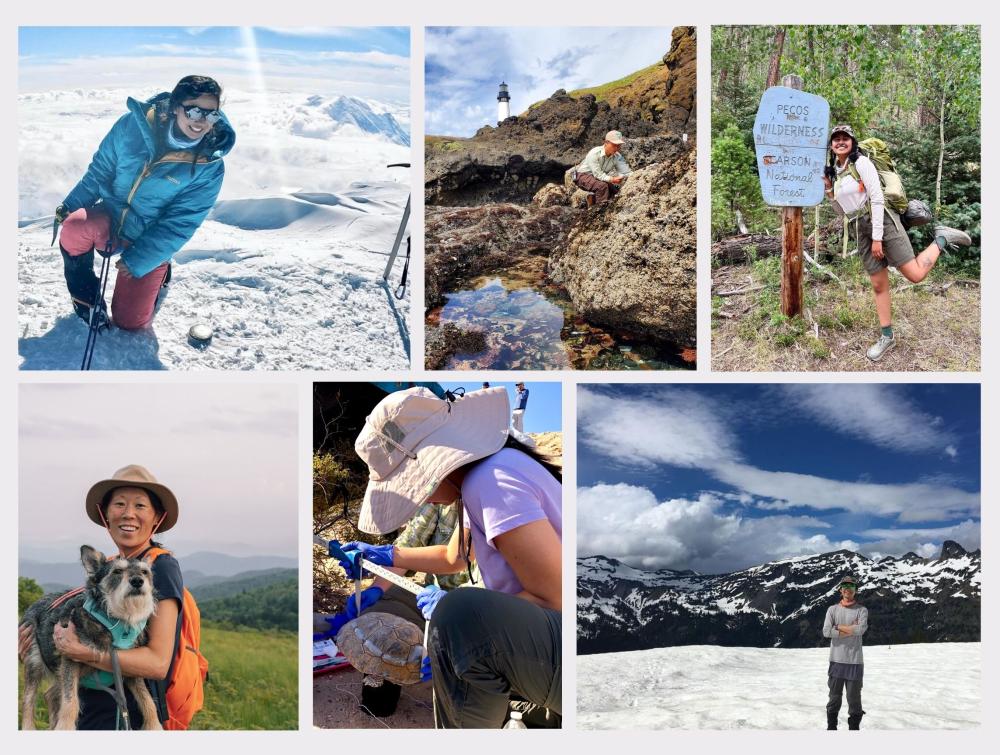
Collage caption: top left corner is Sachiye Koide in Denali; top middle is Edward Kim presenting a virtual education program on intertidal ecology at Yaquina Head Outstanding Natural Area, photo credit: Alyssa Uhen; top right corner: Mahika Rao backpacking in Carson National Forest, New Mexico; bottom right corner: Kai Victor hiking Mt. Rainier in Washington; bottom center: Brooke Su taking measurements of a desert tortoise at the Mojave Desert; bottom left corner: Erin McGrady hiking with her dog Maggie in North Carolina, photo credit: Authentic Asheville.
From climbing Denali to fighting climate change, Asian Americans are making strides in conservation and outdoor recreation.
Like other communities of color, Asian American communities tend to have fewer safe green spaces where they can enjoy nature close to home. And thanks to barriers like language differences and lack of public transportation, not enough Asian Americans have easy access to public lands, either; despite recent increases in visitation, national park visitors remain overwhelmingly white.
To make matters worse, racism continues to plague Asian Americans. Several people have written about their experiences facing anti-Asian microaggressions and verbal assaults while hiking.
By amplifying the voices and stories of Asian Americans in outdoor recreation and conservation, we can work towards more inclusive spaces that are better representative of the country’s population.
We spoke with several people from Asian American communities about their connections to the outdoors and environmentalism, and why they believe it’s important to have equitable access to nature and conservation. Check out their stories below.
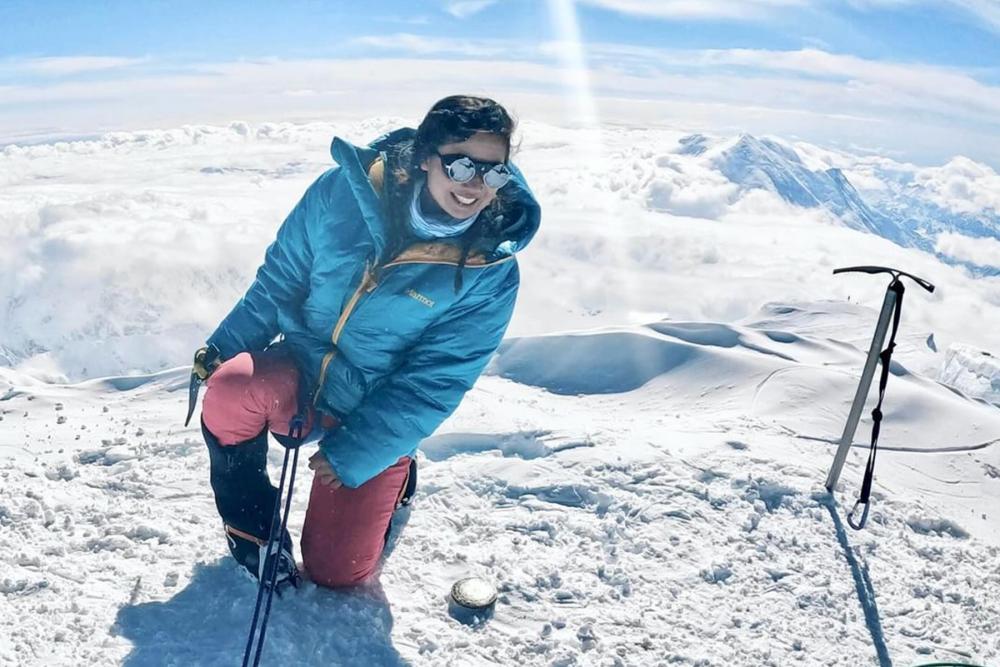
Sachi on the summit of Denali, at Denali National Park and Preserve, Alaska.
Sachiye Koide, California
Sachiye “Sachi” (she/her), a Chinese and Japanese American, has loved the outdoors since childhood hikes with her dad in Yosemite National Park. She has been climbing and mountaineering for seven years, including summiting Denali in Alaska (20,310ft) unguided at just 26 years old! After a series of personal hardships, including family deaths, a near-drowning experience and a toxic relationship, she wrote a list of "impossible and improbable things I'm going to do in my life," to give her something to focus all her energy and hopefully come out the other side more healed. The first thing on the list was to "Climb Denali."
"The entire experience profoundly heightened my feeling of capability and ability to find comfort even in uncomfortable, isolated, cold and hard situations... I feel like I can just exist in this world better. All thanks to this big, tall, cold mountain I struggled up for 10 days. Mountains feel like home to me."
During her climb, Sachi did not encounter any other Asian women, which heightened the sense of remoteness and isolation she already got while climbing the highest peak in North America. Sachi believes everyone deserves to feel at home in outside spaces - comfortable, safe, and welcome - and that's an ongoing push across the board to increase access to gear, spaces, and outdoor education.
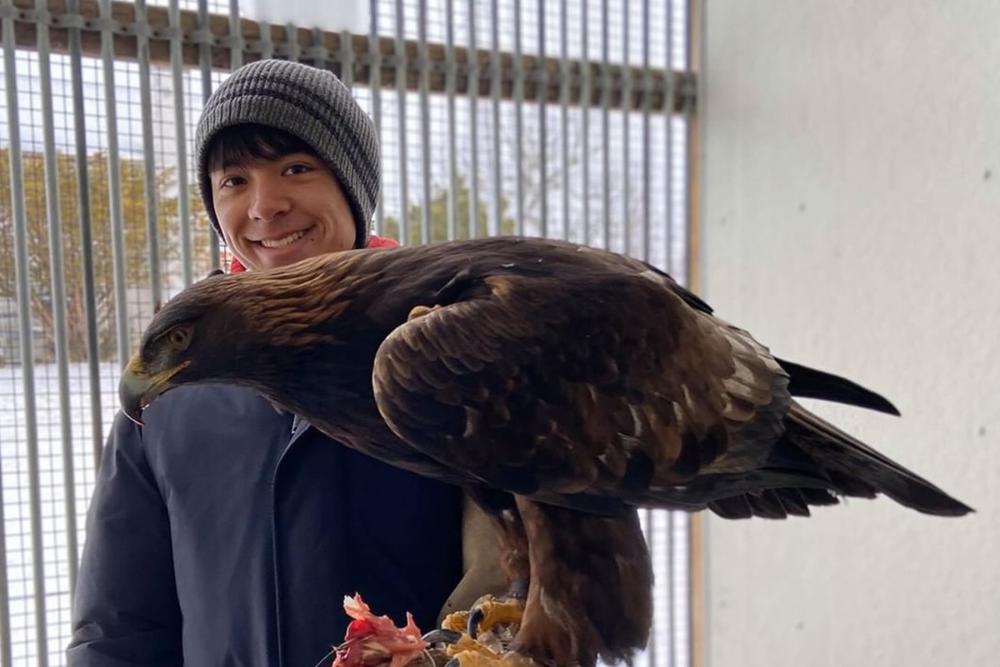
Working with birds of prey is something special for Kai, who is also a licensed falconer.
Kai Victor, Pennsylvania
Kai (he/him) is a passionate scientist with a deep love for the outdoors and wildlife species. Despite growing up in Manhattan, Kai’s parents went above and beyond to take him into nature, fostering a lifelong connection. Now a master’s student at the University of Delaware, Kai has participated in many wildlife research projects across the world and manages to balance the hardships of conservation work with the joys of connecting with nature.
On his days off, Kai goes shed hunting (looking for antlers shed by animals like deer, elk, moose and caribou) and trout fishing. He advocates for activities in nature that don’t damage or deplete the environment, like bird watching and controlled hunting, and believes collaboration between different groups, such as ranchers and environmentalists, is essential for balancing human needs with conservation.
"We really need to all work together. People want more open spaces for their cattle or to let their kids run around... At the end of the day, we all want the same thing but for different reasons. We want to protect these places and ensure they continue to exist, even if our motivations differ.”
Kai advocates for accessible outdoor education and addressing the barriers urban minority communities face in engaging with nature. He believes it's crucial to expose children to the outdoors from a young age to foster a lifelong appreciation and help them understand biodiversity in their own communities.
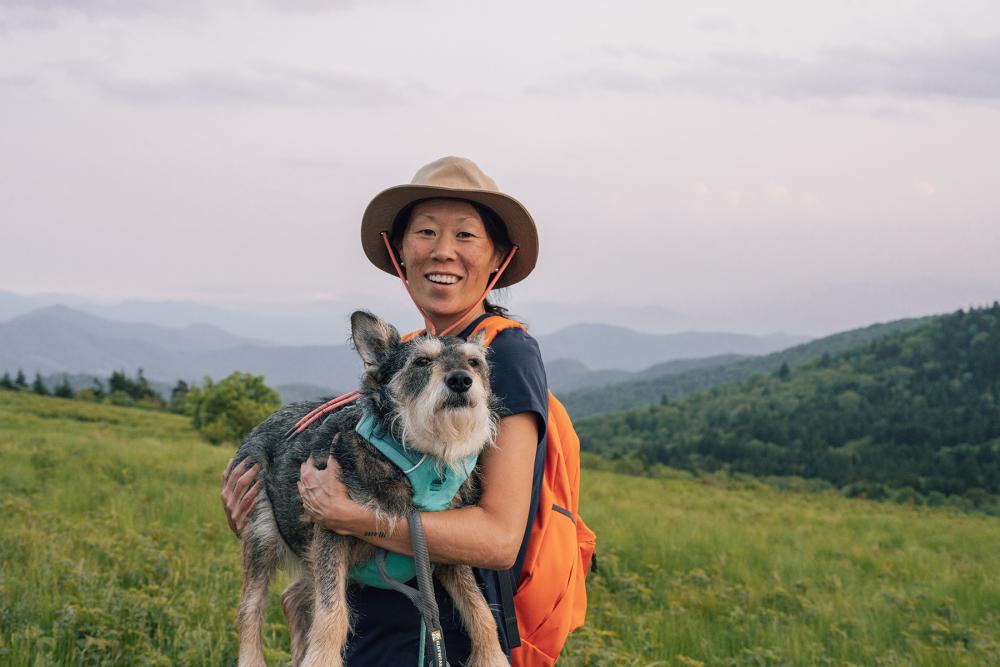
Erin hiking with her dog Maggie in North Carolina.
Authentic Asheville @authenticasheville
Erin McGrady, North Carolina
Erin (she/her) is a queer Korean-American transracial adoptee who works as a filmmaker and photographer alongside her wife, frequently traveling in their camper van for work. Erin's connection to the outdoors began as a child, particularly through a memorable weekend in Shenandoah National Park with her grandparents when she was eight. Her grandparents instilled in her a deep love and appreciation for nature by sharing their adventures and photographs from many national parks, which led Erin to embark on her own solo cross-country trip to visit many of the parks her grandparents loved.
Erin is also an avid runner and loves outdoor activities like biking, camping and hiking—which have helped manage her depression and anxiety by providing a sense of peace and well-being.
Despite her love for the outdoors, Erin has faced challenges. She has often been the only person of color at races and has experienced moments of fear that emphasized the importance of increasing representation and making outdoor spaces more inclusive and accessible.
“The mental and physical health benefits that come from accessing the outdoors are so important, not to mention the social benefits that come with building and partaking in community. They shouldn’t be available just to some people but to everyone.”
Erin is passionate about increasing representation both in front of and behind the camera. She believes that visibility is crucial for inspiring marginalized communities to participate in outdoor activities. Erin’s dedication to inclusivity extends to her community work, exemplified by founding the Asheville Run Crew, which organizes free running and walking events to build community among BIPOC, LGBTQIA2S, and allies.
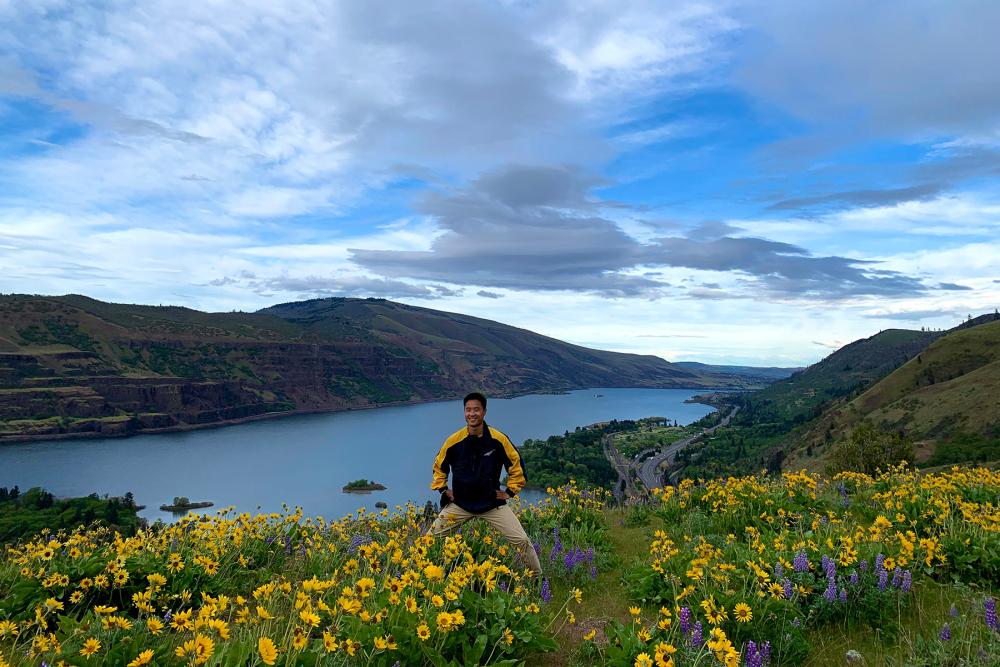
Edward hiking in The Dalles, Oregon.
Max Albicker
Edward Kim, Oregon
Edward (he/him) is an environmental educator pursuing a master’s degree in environment and sustainability management at Georgetown University. Edward's parents instilled in him a love for the ocean and nature by sharing memories of their youth in the coastal cities of Ulsan and Seosan in South Korea. As a child, he loved searching for fireflies, catching toads and birding.
Now an adult, he is driven by a growing sense of climate anxiety to address the climate crisis by promoting sustainability in communities and combating climate misinformation. Edward emphasizes that this fight must involve everyone.
"Inclusivity is important in getting everyone access to the outdoors. The battle against the climate crisis is going to require everybody, and positive change isn’t going to happen if people don't know about or care for the environment.”
Edward believes accessible and inclusive outdoor spaces, accurate information, and environmental connections are all essential for motivating collective action against the climate crisis. He also believes policy and systemic changes must come, and advocates for reducing carbon emissions and transitioning to renewable energy sources.
He also highlights the importance of climate resiliency projects, like those done by National Service and Conservation Corps and the newly announced American Climate Corps. These projects, he says, are crucial for mitigating the impacts of increasingly frequent natural disasters and building sustainable communities.
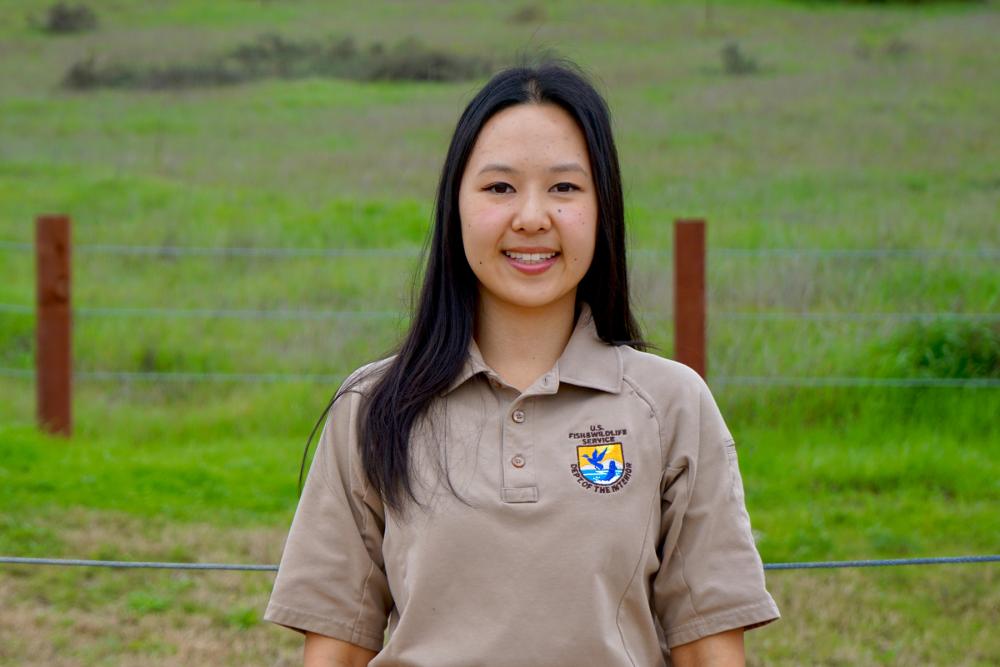
Brooke is a a wildlife biologist working for the U.S. Fish and Wildlife Service.
USFWS
Brooke Su, California
Despite not having an outdoorsy childhood, Brooke (she/her) has been fascinated with animals her whole life. Now she is a wildlife biologist working for the U.S. Fish and Wildlife Service in Palm Springs, California. Her responsibilities include protecting endangered species, with a focus on the Mojave Desert.
Though she enjoys various outdoor sports from snowboarding to rollerblading, rock climbing is her passion. After discovering climbing during a Wind Cave National Park Service internship in South Dakota, she continued to thrive in a supportive climbing community in California—which she says is important in enriching her outdoor life.
“It's one thing to just go and climb by yourself, but then to go and climb with your friends, to meet new friends, and climb with a community, it is such a game changer. it just makes life that much more special.”
While people in South Dakota were friendly, Brooke recalls feeling isolated because of the lack of racial diversity. Having grown up in California in a vibrant Asian community, she missed that sense of community and belonging. This made her value the importance of creating inclusive and diverse spaces, and she now hosts monthly Asian climbing meetups at her rock-climbing gym through Asian Climbing Collective. Through these meetups, she has fostered an Asian climbing community that has grown in number over the years and introduced many new people to the sport.
Aside from climbing, Brooke is actively involved in DEIA efforts at her job and is a member of a Regional DEIA Action Team at the U.S. Fish and Wildlife Service. She also serves as a tribal coordinator and works closely with Tribes in Southern California.
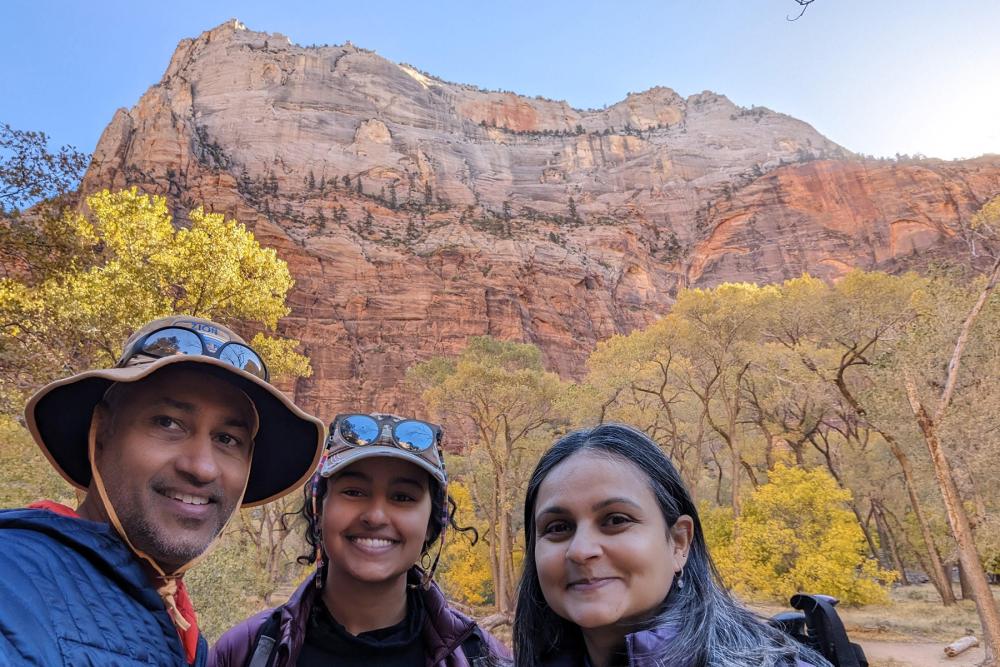
Mahika and her family hiking in Zion National Park, Utah.
Mahika Rao, Washington
Mahika (she/her) works seasonally at the National Park Service in botany and plant monitoring. She focuses on plant identification, data collection and ecological restoration, exploring the impacts of climate change through scientific experiments. She says her early experiences being outdoors led her to the conservation field, and her Indian parents have always been supportive.
"I realized [studying economics] was not what made me happy. Instead, I wanted to be outside in the dirt. My parents were like, 'Remember, when you had all this fun gardening, hiking and camping [as a child]? That clearly made you happy—so why not do what brings you joy?’"
Mahika is also involved in environmental education, particularly with school groups visiting North Cascades National Park. This allows her to witness the transformative effect of nature on children—many of whom are experiencing the outdoors for the first time. She says making outdoor spaces accessible and inclusive is crucial for fostering a connection with the environment, especially among children from underrepresented communities.
Discussing the challenges she’s faced as a person of color in the predominantly white field of conservation, Mahika highlights the need for more diversity and inclusivity. She has often felt isolated because of microaggressions and a competitive culture that values specific outdoor credentials and gear. Because of this, she emphasizes the need for more people of underrepresented groups in leadership positions. Mahika says if there are more people from different backgrounds and experiences, there will be more creative problem-solving—leading to more innovative and effective solutions.
